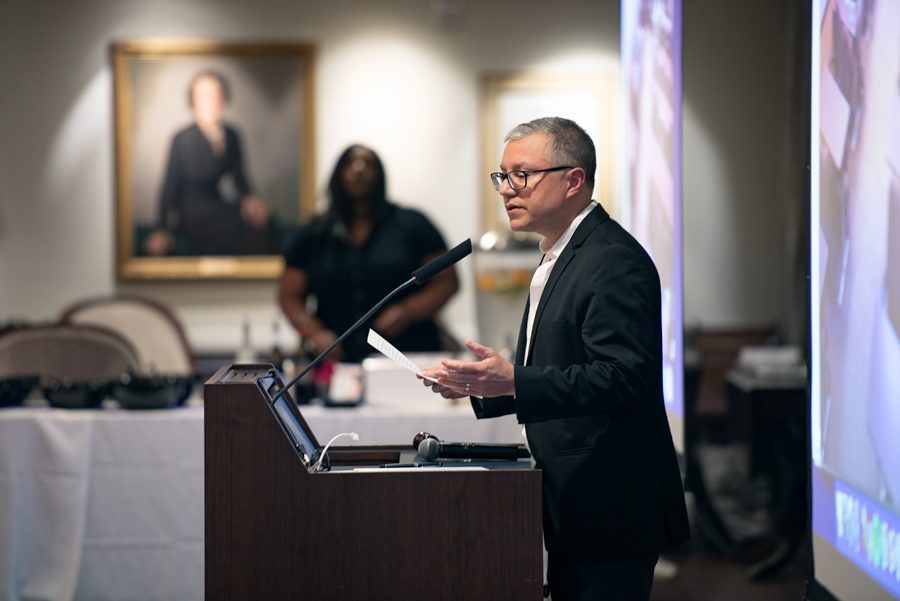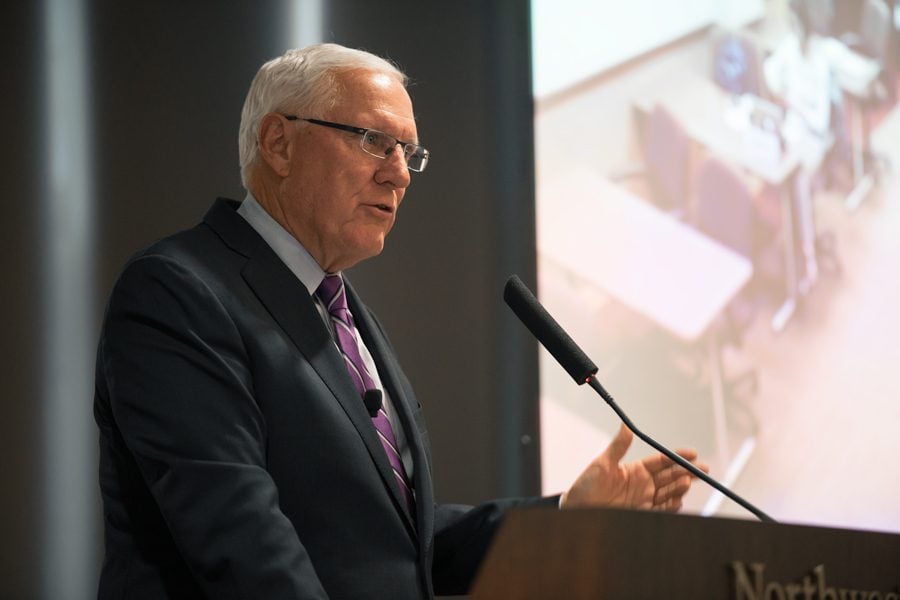NU Board of Trustees chairman: Falsifying tests and bribing coaches is ‘lowest form of activity’
(Evan Robinson-Johnson/Daily Senior Staffer)
J. Landis Martin, the Chairman of Northwestern’s Board of Trustees, spoke at Faculty Senate about the budget deficit, the college admissions scandal and the student experience.
April 11, 2019
The chief of Northwestern’s Board of Trustees on Wednesday denounced the participants of a college admissions scandal that has sparked a renewed national conversation on college access and admissions, calling the acts “despicable” and the “lowest form of activity.”
In a brief interview with The Daily after remarks at a Faculty Senate meeting, Chairman J. Landis Martin (Kellogg ’68, JD ’73) said it “was very distressing” to learn of the news that wealthy parents falsified test scores and bribed coaches to secure college admission for their children. Asked if the University has opened an investigation into the student of Northwestern parents implicated in the scheme, Martin said he wasn’t aware of any action since the news broke late last month.
“I’m aware that … one of the children of one of the parents that had an issue with their other daughter, is a student, was a student here,” he said. “I know that if that person was involved, as the press alleges, in falsifying the ACT or SAT, that that’s grounds for some type of action, possibly expelling. But I haven’t heard anything in two weeks.”
The Daily reported in March that Manuel and Elizabeth Henriquez, whom federal prosecutors allege paid bribes to facilitate cheating on college entrance exams for their two daughters, are listed as parents of a Northwestern student. Martin said University President Morton Schapiro informed him of the news after reading it in The Daily.
Martin, a Denver-based chairman and managing director of Platte River Equity, a private equity firm, stressed the importance of faculty during his initial remarks at the meeting, praising them for an increase in grants, awards and impactful research. He called faculty — both tenured and non-tenured — the “heart and soul” of the University, and said most of the Board considers them to “be the most important part of Northwestern.”
Still, Martin acknowledged the importance of improving the student experience. He praised the rise in stipend values for graduate students, though he recognized the need to further increase stipends to remain competitive with other graduate schools.
In a Q&A session after his speech, Art History Prof. Claudia Swan asked Martin to comment on the Board’s effort to connect with students. The student population is very different from 20 years ago, Swan said, which is “very exciting in the classroom” but presents additional responsibility and pressure on professors to address “economic diversity as it impacts students’ ability to do their coursework.”
Martin, himself a Northwestern alumnus who attended on scholarship, said the Board tries to meet with students at least once a year, though he admitted that students were “cherry-picked” by the Student Affairs office. He said some students were able to identify with some members of the board, made up of about 32 percent women and 14 percent racial minorities.
He also said students’ busy schedules presented additional challenges. “We know that these kids are under pressure,” Martin said. “We are constantly discussing those issues at the Board and trying to reinforce the effort the administration is taking on that area.”
After the meeting, Martin told The Daily that meetings with students occur every two years, on average. Asked if he had attended undergraduate Associated Student Government or Graduate Leadership and Advocacy Council meetings, he said he hadn’t, though he would be open to it.
During his speech, Martin boasted Northwestern’s reputational rise in the higher education community. He acknowledged the hardships faced by faculty due to budget cuts.
In governing Northwestern, Martin said the Board is “not as sensitive as we should be” in distinguishing between a corporation and a university, which is more “complex” and has a more rigid workforce.
“As we’ve gone through this latest budget issue, and fully implement some of the changes over the next couple of years, I’m going to try to do my part to make sure that the Board and the president are in lockstep and doing things the right way, but not diminishing our reputation, not diminishing the enthusiasm you all have towards your work,” he said.
Faculty Senate President Baron Reed called the meeting “productive” and said the University is in a “good position to make the tough decisions” to stabilize the budget.

Baron Reed at Faculty Senate on Wednesday.
“Mr. Martin showed that he has an excellent grasp of the distinctive nature of the university and the ways in which it differs from a corporation,” Reed said in an email to The Daily. “He understands how important the reputation of the university is to the faculty whose work both shapes it and is enhanced by it. I think he was able to reassure faculty that he sees how the austerity measures necessitated by the budget deficit can have a negative impact on research and teaching.”
Of Craig Johnson, the vice president for business and finance, Martin said in the interview that he is doing a “terrific job.” Nim Chinniah, the former executive vice president who resigned amid the worsening budget deficit, was not forced out — leaving “was his choice as I recall it,” Martin said.
Phil Harris, the former general counsel who left quietly last fall, also departed from the University on his own.
“Phil felt he had better opportunities in California and he decided to move in that direction,” Martin said.
Email: [email protected]
Twitter: @_perezalan_


